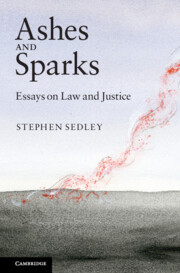Book contents
- Frontmatter
- Contents
- Preface
- Acknowledgements
- PART I History
- 1 Victors' justice
- 2 Above it all
- 3 Reading their rights
- 4 From victim to suspect
- 5 Farewell sovereignty
- 6 No law at all
- 7 The sound of silence
- 8 The spark in the ashes
- 9 Wringing out the fault
- 10 Everything and nothing
- 11 Skulls and crossbones
- PART II Law
- PART III Justice
- Index
11 - Skulls and crossbones
Published online by Cambridge University Press: 05 June 2012
- Frontmatter
- Contents
- Preface
- Acknowledgements
- PART I History
- 1 Victors' justice
- 2 Above it all
- 3 Reading their rights
- 4 From victim to suspect
- 5 Farewell sovereignty
- 6 No law at all
- 7 The sound of silence
- 8 The spark in the ashes
- 9 Wringing out the fault
- 10 Everything and nothing
- 11 Skulls and crossbones
- PART II Law
- PART III Justice
- Index
Summary
This was a review, published in the London Review of Books in 2010, of two books about piracy, each written from a peculiar angle – The Enemy of All by Daniel Heller-Roazen (the pirate as terrorist) and The Invisible Hook by Peter T. Leeson (the pirate as economic maximiser) – together with a new edition of Nigel Rodley's classic work on The Treatment of Prisoners under International Law.
I admit to having excised at proof stage some strong comments about the first of these books. One tries to be candid but not to wound.
When Germany's ultimatum – delivered, as the Kaiser had explained, ‘only with the friendliest intentions towards Belgium’ – expired in August 1914, von Emmich's infantry crossed the frontier in parade-ground order, accompanied by horse-drawn field kitchens with fires burning and army cooks at attention stirring the regimental stew.
They don't wage war like that any more. Indeed the big wars are rarely now between neighbours: one state will cross a continent or an ocean to attack or invade, or occasionally to defend, another. The choreographed exchange of diplomatic threats, the ultimatum, the formal declaration of a state of war, have been pretty much dispensed with. The last time the United Kingdom declared war was against Bulgaria in 1941.
Among the casualties of warfare during the last hundred years have been many of the rules governing the conduct of hostilities. The Hague and Geneva Conventions describe members of warring states' armies and militias as ‘lawful combatants’.
- Type
- Chapter
- Information
- Ashes and SparksEssays On Law and Justice, pp. 131 - 138Publisher: Cambridge University PressPrint publication year: 2011



